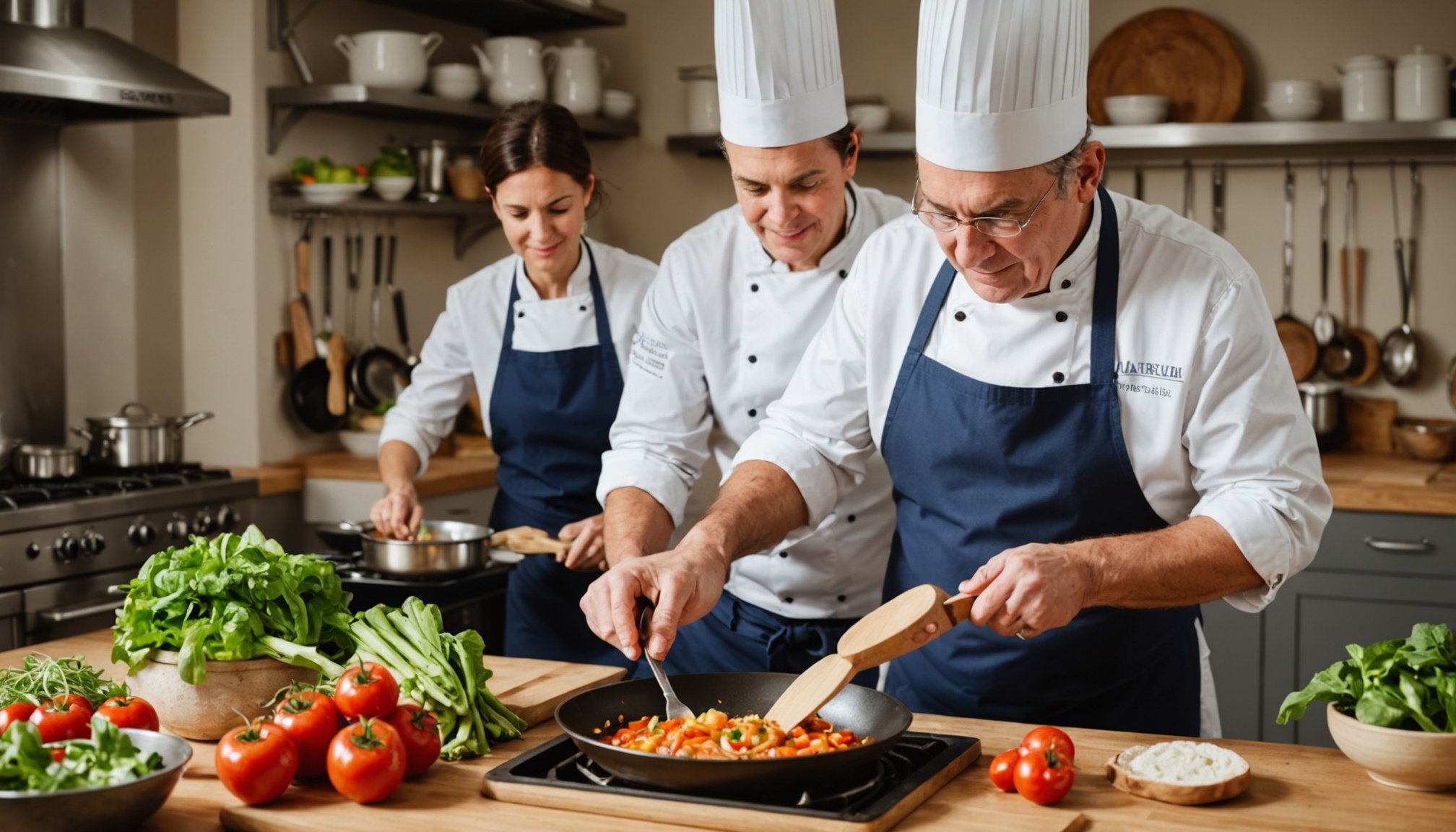Understanding Sustainable Cooking Practices
Sustainable cooking involves eco-friendly practices that emphasise reducing environmental impact and promoting health. Central to this is the concept of seasonality in ingredient selection. Choosing ingredients in season ensures that they are at their freshest and have travelled shorter distances, reducing carbon footprints. This not only enhances flavour but also supports local economies and responsible ingredient sourcing.
An important facet of sustainable cooking is reducing food waste. By planning meals carefully, using leftovers creatively, and understanding portion sizes, individuals can minimise waste. Composting scraps not only reduces landfill contribution but enriches soil, nurturing future growth. Engaging in such practices forms a cycle of sustainability.
In parallel : Crafting a Luxurious Bison Burger Topped with Irresistible Blueberry BBQ Sauce: A Gourmet Delight!
Eco-friendly practices extend beyond just ingredient choices. They encompass energy usage, utensil selection, and cooking methods. Opting for electric over gas stoves, using energy-efficient appliances, and minimising high-heat cooking methods contribute to a sustainable kitchen. Additionally, choosing utensils made from recyclable materials adds another layer of responsibility.
Incorporating sustainable cooking may seem challenging, but small adaptations yield significant benefits. By understanding and applying these practices, individuals actively participate in environmental conservation while enjoying delicious, nutritious meals. Sustainability in cooking provides a rewarding avenue to support the planet and personal health, encouraging mindful living and responsible ingredient sourcing.
In parallel : Crafting a Luxurious Bison Burger Topped with Irresistible Blueberry BBQ Sauce: A Gourmet Delight!
Sustainable Ingredient Sourcing
Embracing sustainable ingredient sourcing can empower consumers to make environmentally responsible choices. This approach focuses on local sourcing, organic produce, and sustainable food systems, addressing the demand for eco-friendly and ethical consumption.
Benefits of Buying Local
Choosing local sourcing provides multiple benefits. By purchasing products from nearby farmers, consumers help reduce carbon emissions associated with transportation. This practice also supports regional economies and fosters a sense of community. Additionally, local produce often means fresher, seasonal products, offering superior taste and nutritional value.
Understanding Organic Labels
Understanding organic labels is crucial for making informed decisions. Organic produce is grown without synthetic pesticides and fertilizers, promoting healthier soil and ecosystems. However, not all labels guarantee authenticity. Evaluating organic certifications, such as USDA Organic, can help consumers identify genuinely organic products and ensure environmental impact is minimized.
Supporting Sustainable Food Systems
Supporting sustainable food systems is essential for a greener future. This involves prioritizing local sourcing, endorsing sustainable farming practices, and encouraging biodiversity. The importance of supporting local farmers cannot be overstated, as it uplifts community livelihoods and ensures food security. Moreover, sustainable practices, like crop rotation and reduced pesticide use, significantly enhance environmental health, contributing to a more resilient planet.
Eco-Friendly Cooking Methods
Energy-efficient cooking not only helps reduce your carbon footprint but also saves money on utility bills. Induction cooktops, for example, use electromagnetic energy to directly heat pots and pans, minimizing heat waste. This method is more energy-efficient compared to traditional gas or electric stoves.
Pressure cookers and slow cookers are other great options for sustainable cooking, as they consume significantly less energy by cooking food rapidly or at lower temperatures for extended periods. These appliances are perfect for preparing everything from stews to roast meats, using minimal energy.
Zero waste cooking involves using sustainable kitchen tools and making the most out of ingredients. Mandoline slicers, for instance, help in creating uniform cuts, reducing waste. Sturdy silicone baking mats are reusable and eliminate the need for disposable parchment paper or aluminum foil, keeping waste out of landfills.
Batch cooking and meal prep can dramatically cut energy consumption. By preparing meals in advance, you reduce the need for daily cooking, making it easier to optimise oven usage and reduce energy consumption. Plan meals that utilise shared ingredients to minimize waste and ensure that every part of your food is used creatively. This holistic approach not only promotes a sustainable kitchen but fosters a thoughtful relationship with food and resources.
Meal Planning for Minimal Waste
Effective meal planning is a key component of reducing food waste, ensuring that every bit of groceries purchased serves a purpose. The goal is not just to stock up on essentials, but to plan meals that use ingredients efficiently, leading to minimal waste.
Creating a Sustainable Meal Plan
The process begins with identifying meals that align with your dietary needs and preferences, then transitioning to a strategy for meal prep. Prioritising meals that use similar ingredients reduces the chance of leftover ingredients spoilage. For instance, if you buy fresh herbs for a recipe, plan another meal that incorporates them later that week.
Best Practices for Food Storage
Effective food storage plays a crucial role in waste reduction. Key practices include using airtight containers for dry goods, which keeps food fresh for longer and prevents contamination. Additionally, understanding the optimal temperatures for the refrigeration of different foods ensures longevity. Freezing leftovers promptly can extend their life by several weeks.
Utilizing Leftovers Creatively
Leftovers need not be mundane; with a bit of creativity, they become entirely new meals. Transform that roast chicken into soup or sandwiches. A bit of consistency in planning and creativity in the kitchen can turn waste reduction strategies from chore to joy.
Sustainable Recipes
When it comes to embracing sustainability in cooking, finding simple yet delicious plant-based recipes can yield numerous benefits. These meals not only reduce environmental impact but also encourage a healthier lifestyle. Let’s explore different aspects of sustainable recipes.
Quick Plant-Based Meals
Crafting quick plant-based meals doesn’t have to be a challenge. In fact, such meals can be both time-saving and nutrient-rich. For instance, a stir-fry using tofu and mixed vegetables can be prepared in under 30 minutes, providing a burst of flavour and essential nutrients. Another quick option is a chickpea and avocado salad, which combines protein and healthy fats, perfect for busy days.
Seasonal Recipe Ideas
Embracing seasonal cooking is a wonderful way to support local farmers and enjoy the freshest produce. During autumn, a pumpkin soup spiced with cumin can be both comforting and sustainable. In spring, asparagus risotto offers a delightful use of fresh greens. Highlighting seasonal produce ensures optimum taste and nutritional value.
Cooking with Leftover Ingredients
Innovative recipes using common leftovers can significantly cut down on food waste. Transform surplus rice into a satisfying fried rice dish, or repurpose stale bread into croutons for a crunchy salad topping. By creatively using leftovers, not only do you save money, but you also contribute to a sustainable kitchen practice.
Benefits of Cooking for Personal Growth and Environmental Impact
Cooking is not just about preparing meals; it’s a gateway to enhancing culinary skills and sparking creativity. As you experiment with different ingredients and techniques, you refine your cooking skills and gain a deeper understanding of flavour profiles. Imagine the joy of creating a dish that pairs unexpected ingredients or mastering a complex recipe that once seemed daunting.
Furthermore, cooking at home shifts your focus towards environmental consciousness. By selecting locally-sourced ingredients and reducing food waste, you contribute to sustainable practices. Through mindful cooking habits, you become more aware of your consumption patterns and their impact on the environment. Choose seasonal produce, and you’ll discover not only fresh flavours but also reduce your carbon footprint.
Consider the personal journey of someone who, intrigued by reducing plastic waste, started making homemade sauces. This led to a newfound appreciation for sustainable cooking practices and inspired others in their community to do the same. Such personal stories underscore the power of cooking as more than a skill; it’s a tool that enhances personal development through cooking while fostering a greener planet.
By nurturing your cooking abilities and embracing sustainable choices, you not only grow personally but also positively impact the environment.











